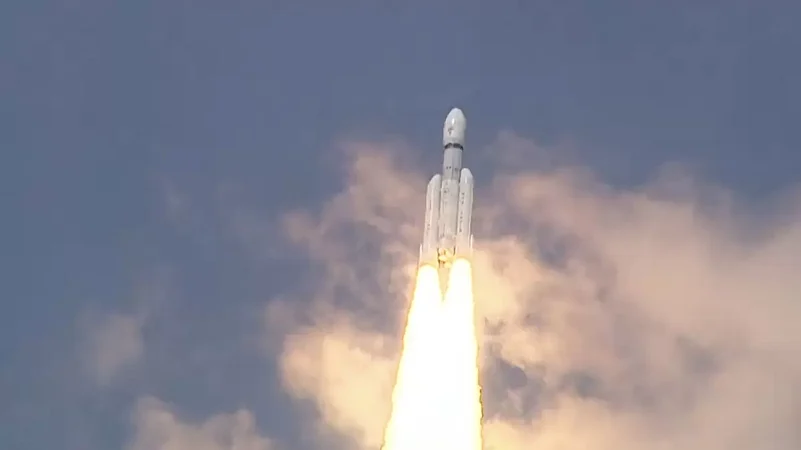Marking a major milestone in the Indian space programme, the Chandrayaan-3 had a successful lift-off at 2:35 pm on Friday and began its month-long journey to the Moon.
The Geosynchronous Satellite Launch Vehicle Mark-3 (LVM-3) blasted off from the Satish Dhawan Space Centre, Sriharikota, Andhra Pradesh, with the Chandrayaan-3 spacecraft.
Following the lift-off, Prime Minister Narendra Modi tweeted that Chandrayaan-3 has scripted a new chapter in India's space odyssey.
Around 16 minutes after launch, the LVM-3 placed the the Chandrayaan-3 into the orbit, from where it would travel to the Moon. This step of separation of the Chandrayaan-3 spacecraft from the rocket carrying it marked the completion of the successful launch.

ISRO chief S Somanath on Friday said that the infusion of Chandrayaan-3 into the orbit of Moon is planned from August 1 and and the soft-landing is planned at 5:47 pm on August 23. Once on the surface on the Moon, the equipment aboard Chandrayaan-3 would carry out investigations for 15-Earth days.
Sharing the video of lift-off, Minister of State (Independent Charge) Department of Space Dr Jitendra Singh called the lift-off a moment of a glory. He is present at the ISRO facility of Sriharikota.
The Indian Space Research Organisation (ISRO) live-streamed the Chandrayaan-3 launch and subsequent stages of its journey to the Moon on YouTube.
Chandrayaan-3 is the successor to Chandrayaan-1 and -2. The first mission helped confirmed the presence of water on the Moon in 2008 and the second mission in 2019 was only partially successful as while it placed the orbiter around Moon, the lander crashed on the surface of the Moon and was lost.
The Chandrayaan-3 is set to land on the South Pole of the Moon where no spacecraft has landed before.
The Moon's South Pole is a shadowy unexplored region and insights gathered by Chandrayaan-3 during its 15-day-long mission on Moon would be keenly studied by all the space agencies of the world. The Artemis-III mission of the United States, which would take humans to the Moon for the first time in over 50 years, would also land on the South Pole in the next few years.
Ahead of the launch, Prime Minister Narendra Modi termed the Chandrayaan-3 a "remarkable mission" and said it carries the hopes and dreams of the nation. In a series of tweets, he hailed the scientists involved in the project and highlighted the importance of the Chandrayaan programme.
Modi tweeted, "Till Chandrayaan-1, the Moon was believed to be a bone-dry, geologically inactive and uninhabitable celestial body. Now, it is seen as a dynamic and geologically active body with the presence of water and sub-surface ice. Maybe in the future, it can be potentially inhabited!"
To mark the Chandrayaan-3 launch, which is the latest demonstrations of the bold Indian space ambitions, Outlook published a series of stories that look at the Indian space programme and the human spacefaring ambitions.
In the introductory story, Madhur Sharma looks at the Chandrayaan-3 mission and its bold pursuit of the South Pole of the Moon where no spacecraft has ever gone before. He explains why the landing on South Pole matters and explores where ISRO and the Indian space programme are headed.
In an opinion piece, Abhik Bhattacharya writes about the importance of scientific temperament and questions whether we can really celebrate Chandrayaan-3 at a time when Darwin's theory is being removed from school books.
Madhur Sharma also looks at the human ambition to be a spacefaring race and how and when that can be a reality.
Kushagra Srivastava in his story looks at the billionaire space race as the likes of Elon Musk and Jeff Bezos with their space companies compete to reach new milestones at the earliest.


























